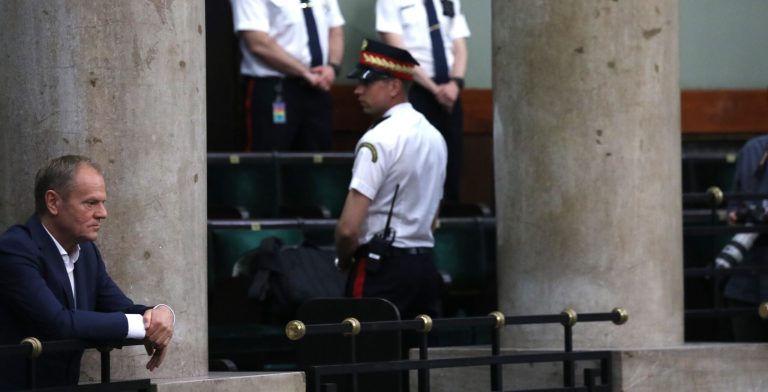Polish government approves changes to remove political influence over judicial council

The Polish government has approved changes to the National Council of the Judiciary (KRS), the body responsible for nominating judges, which was placed under greater political control by the previous ruling Law and Justice (PiS) party.
Depoliticising the KRS – which has been found by Polish and European court rulings to no longer be a legitimate body as a result of PiS’s reforms – was a central pledge by Donald Tusk’s government when it took office in December. It was also a demand of the European Commission in order to unlock Polish funds frozen over rule-of-law concerns.
Under the legislation now approved by the Polish government, 15 KRS members will be elected by all Polish judges in a direct and secret ballot rather than by parliament, as has been the case since 2018. “This solution will make the KRS independent of the legislative branch,” the justice ministry said, presenting the draft.
Najważniejsze rozwiązania ⤵️
• 15 sędziów – członków Krajowej Rady Sądownictwa będzie wybieranych przez wszystkich polskich sędziów, a nie jak do tej pory – przez Sejm. Dzięki takiemu rozwiązaniu KRS stanie się niezależna od władzy ustawodawczej.
• Wybory 15 sędziów do… pic.twitter.com/cDV11CDrcp
— Min. Sprawiedliwości (@MS_GOV_PL) February 20, 2024
Members of the KRS will be selected from among Supreme Court judges (1 member), appeal court judges (2 members), district court judges (3 members), regional court judges (6 members), military court judges (1 member), Supreme Administrative Court judges (1 member) and provincial administrative court judges (1 member).
Currently, in addition to 15 judges chosen by the lower chamber of the parliament, the Sejm, the KRS also includes four MPs chosen by the Sejm, two senators chosen by the higher chamber, the Senate, the chief justice of the Supreme Court, the head of the Supreme Administrative Court, the justice minister and one person appointed by the president.
Under the newly proposed changes, candidates for the KRS could only be put forward by other judges, whereas currently this right has also been granted to the Supreme Bar Council, the National Council of Legal Advisers, the National Council of Prosecutors at the Prosecutor General, universities and a group of at least 2,000 citizens.
Justice Minister @Adbodnar has presented plans in Brussels to restore the rule of law by reversing violations by the former PiS government.
EU Commission Vice President @VeraJourova welcomed the move and pledged to help Poland exit the Article 7 procedurehttps://t.co/3qPDuJYUFG
— Notes from Poland 🇵🇱 (@notesfrompoland) February 20, 2024
According to the proposed bill, the first elections under the new rules are to be ordered by the National Electoral Commission (PKW) within 21 days of the legislation coming into force and are to be held within three months.
The judges who were appointed under the PiS-overhauled KRS will not have the right to stand as candidates in these elections unless they have held judgeships prior to the PiS changes and were re-appointed since 2017 after relinquishing the office, for example, to serve in diplomatic service or a state institution.
Upon the election of the new members of the KRS, the activity in the council of judges elected to the KRS on the basis of legislation passed by the PiS will come to an end.
„Is Poland heading for a constitutional crisis?” asks @AleksSzczerbiak.
Its bitter political and systemic conflict has been exacerbated by the fact that the two sides appear to increasingly operate within different legal orders https://t.co/Vf9Nk5bTw4
— Notes from Poland 🇵🇱 (@notesfrompoland) February 6, 2024
The bill will now pass to the Polish parliament, where the ruling coalition has a majority in both chambers. In order for it to come into force, however, it also needs to be signed by President Andrzej Duda, who is a PiS ally. He could instead veto the law or send it to the Constitutional Tribunal, another body under PiS influence, for assessment.
PiS politicians criticised the new government’s plans and expressed outrage that the bill was not consulted with the president.
“I am concerned that [in reality] no one wants to pass this law, but they want to create a public discussion or even a political scramble. After all, these decisions, in view of the president’s prerogative, should be consulted with the president,” said Waldemar Buda, a former PiS government minister, quoted by the WPN news website.
“I am convinced that today’s status of the KRS and the appointment system…is acceptable,” Buda added. “If someone wants to change it, go ahead, you need a majority and the consent of the president. At the moment, I don’t think there is such an agreement.”
Przyznanie wyłącznie sędziom prawa do zgłaszania kandydatów do #KRS i pozbawienie tego prawa https://t.co/5y398glCUC. obywateli, jest błędem – uważa Naczelna Rada Adwokacka.
🔽https://t.co/PnlYsQB4yo
— Rzeczpospolita Prawo (@RPPrawo) February 19, 2024
The head of the Supreme Bar Council, Przemysław Rosati, meanwhile, argued that granting only judges the right to propose candidates for the KRS and depriving citizens, among others, of this right, was a mistake, reports the Rzeczpospolita daily.
Bartłomiej Przymusiński, the president of Iustitia, a judges’ body critical of the changes introduced under PiS, also expressed regret at the exclusion of citizens from the process of identifying candidates for the KRS.
“Courts should be open to citizens and other organisations,” he told the Dziennik Gazeta Prawna daily.
Sędziowie 'Iustitii’: Sądy powinny być otwarte na obywatelihttps://t.co/v6PcabTtEm @bprzymusinski pic.twitter.com/bG5wROF4DN
— IUSTITIA Stowarzyszenie Sędziów Polskich (@JudgesSsp) February 20, 2024
The current head of the KRS, Dagmara Pawełczyk-Woicka, in turn, objected to the provision stipulating KRS members’ removal following the election of new members. In a video published on KRS’s social media, she called for people to sign a petition “in defence of the legal security of citizens and the irremovability of judges”.
“An attempt to undermine several thousand judicial appointments will cause legal chaos that is difficult to imagine and will threaten the security of citizens and even the security of our homeland,” reads the petition.
Przewodnicząca @KRS_RP zachęca do podpisania petycji w obronie niezawisłości sędziów i praworządności, przygotowanej przez @sedziowierp https://t.co/nkTEoyjrXw pic.twitter.com/3lCwjseuHD
— Krajowa Rada Sądownictwa (@KRS_RP) February 19, 2024
The proposals for change was, however, welcomed by some judges critical of the previous government.
“The key and best solution is to return to the constitutionality that has been shattered, i.e. the election of parts of the KRS by judges,” former KRS spokesman and member judge Waldemar Żurek, who took Poland to the European Court of Human Rights (ECtHR) over the changes introduced under PiS, told the Polish Press Agency (PAP).
Notes from Poland is run by a small editorial team and published by an independent, non-profit foundation that is funded through donations from our readers. We cannot do what we do without your support.
Main image credit: Krajowa Rada Sądownictwa

Alicja Ptak is senior editor at Notes from Poland and a multimedia journalist. She previously worked for Reuters.






